 |
| Diana |
London, Nov. 24 (Reuters): Queen Elizabeth’s husband has dismissed reports he called his late daughter-in-law Princess Diana a “harlot” and a “trollop” in the latest embarrassing controversy for Britain’s royal family.
“Prince Philip wishes to make it clear that at no point did he ever use the insulting terms described in media reports, nor that he was curt or unfeeling in what he wrote,” read an unusually long statement from the royal household.
The denial came after a report in the Mail on Sunday tabloid newspaper two weeks ago in which Diana’s self-styled “energy healer” Simone Simmons said she had been shown insulting letters from Philip to the princess, who died in a 1997 Paris car crash.
“He regards the suggestion that he used such derogatory terms as a gross misrepresentation of his relations with his daughter-in-law and hurtful to his grandsons,” added the statement from Buckingham Palace.
But Simmons insisted that she stood by what she had told the newspaper. “I saw the letters with my own eyes,” she said. “She (Diana) was heartbroken, they made her feel worse than she already felt.”
Asked if she saw the words “harlot” and “trollop” in the letters, Simmons said: “Yes, they stuck out like a sore thumb.”
Philip, who has always denied any rift with Diana, is a plain-talker prone to verbal gaffes. He once told British students in China: “If you stay here much longer you’ll all be slitty-eyed” and asked Australian Aborigines if they still threw spears at each other.
The reports of his derogatory references to Diana surfaced after the collapse last month of the trial of her former butler Paul Burrell, accused of stealing her belongings after she died.
The trial spurred a rush of stories in British tabloids seeking, and paying for, revelations about Diana from friends and former employees. Accusations of homosexual rape and fraud by aides to Prince Charles, Diana’s former husband, also surfaced, prompting a palace inquiry.
The latest scandals to beset the royals have sent public support for them to its lowest level for 15 years — 43 per cent — according to an ICM poll for the Guardian newspaper earlier this week.










